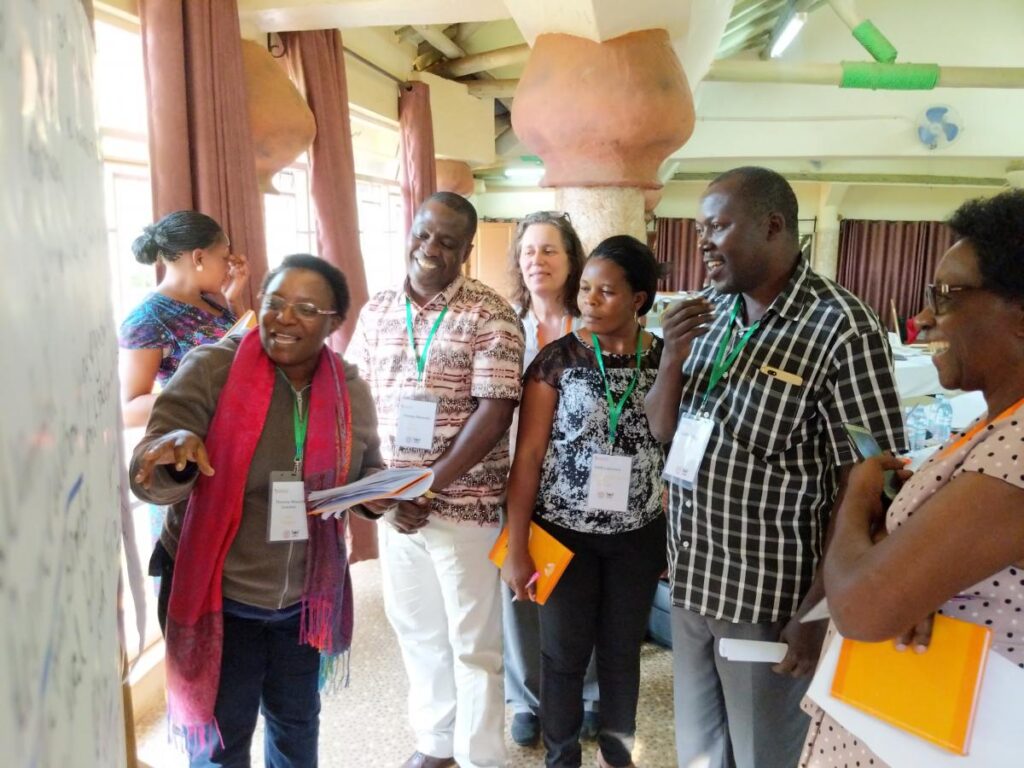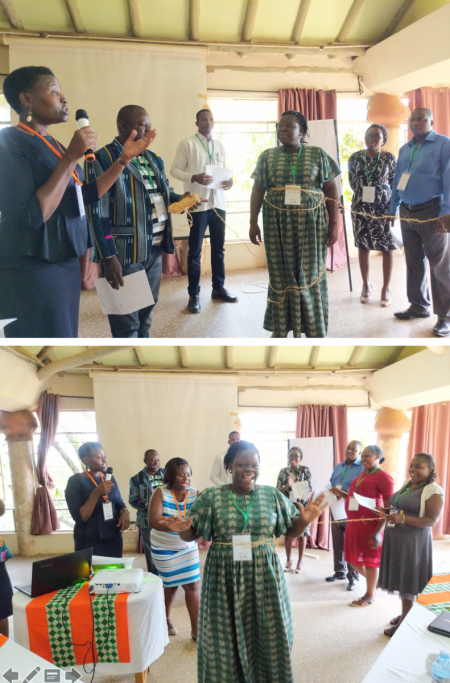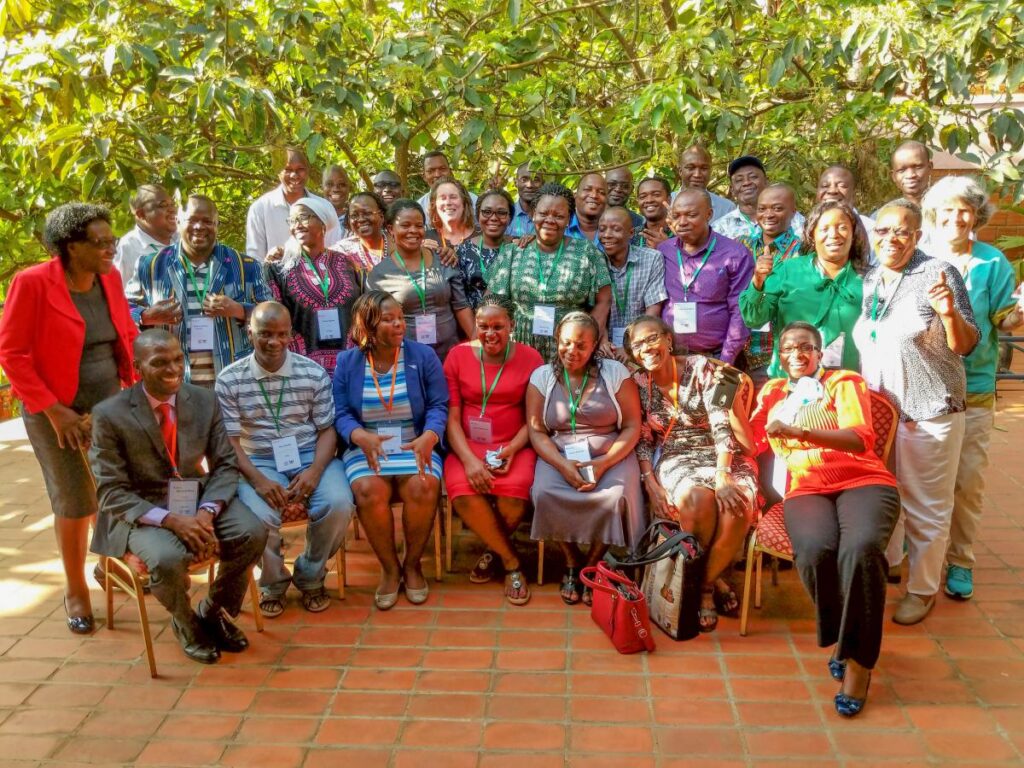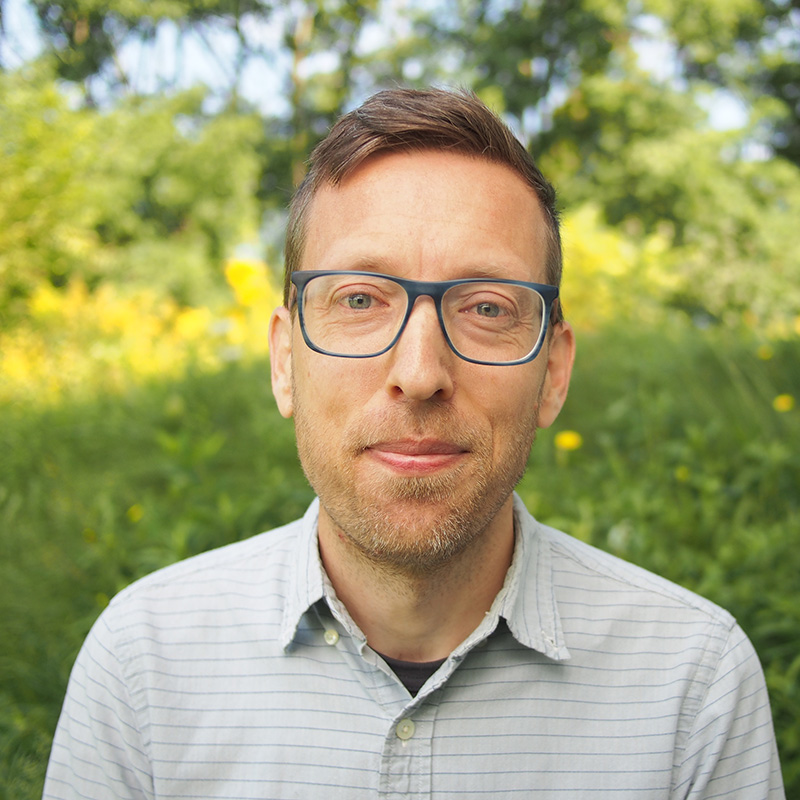While ‘gender mainstreaming’ has largely been mainstreamed, at least in organizational strategy documents, many researchers remain confused as to why they should care about gender, and how to meaningfully and effectively incorporate it into their work. A five-year project conducted jointly by Makerere University in Uganda and Cornell University in the United States, Gender-responsive Researchers Equipped for Agricultural Transformation (GREAT), is charting a path forward to resolve this. The main focus of GREAT, a series of three-part, intensive trainings for agricultural researchers from across sub-Saharan Africa, addresses this issue by giving hands-on applied trainings in gender theory, methods and practice, covering each step of the agricultural research cycle.

Participants from the GREAT Gender-Responsive Legume Breeding course present initial research plans
while Christine Leuenberger (center), from Cornell University’s Science and Technology Studies
Department, and Margaret Mangheni (right), from Makerere Unversity’s College of Agricultural and
Environmental Sciences, look on and provide feedback. Photo: Devon Jenkins
Unlike most existing gender trainings, GREAT insists that training teams consist of both social scientists and biophysical scientists, like plant breeders. According to the co-Principal Investigator for GREAT, Margaret Mangheni, “bringing interdisciplinary teams together to learn about gender is terribly important, but it’s not easy! This focus on interdisciplinarity is key to what makes GREAT different, and as we’re starting to see from our previous cohorts, it really has an impact on the researchers we train.”
Each GREAT course focuses on a different thematic area; the first course, in 2016-2017 covered roots, tubers and bananas, while the second course, in 2017-2018, covered cereal grains. The third GREAT course, focused on legumes such as groundnuts (peanuts), cowpeas, common beans, and underutilized crops like Bambara groundnut, started on Monday, July 23, 2018. As with previous courses, participants take an immersive journey, gaining exposure to both the science of gender and the science of plant breeding, as well as hands on, extensive training in mixed methods research approaches. This creates mutual respect for each methodological approach, though as Mangheni cautions, “we’re careful to make sure people don’t walk away thinking they’re instant experts. Plant breeders shouldn’t walk away from GREAT thinking that they’re now qualified social scientists any more than social scientists should walk away thinking they are now plant breeders. Rather, we emphasize that to conduct good agricultural research for development, social scientists need to work together with the breeders applying their disciplines synergistically to resolve complex societal problems within a larger context.” Doing so, Mangheni says, allows them each to expand their impact, and make sure that it is equitably shared amongst men and women.
Furthermore, this focus on interdisciplinarity builds the capacity of plant breeders to make better, more informed decisions in setting up, budgeting and executing research projects. For example, by knowing more about qualitative research methods, plant breeders can more effectively collaborate with social scientists to adequately budget and plan research projects.

Top: Peace Musiimenta (left), from Makerere University’s School of Women and Gender Studies, leads participants through a hands-on demonstration of gender-based constraints; bottom: participant Julienne Gué (center), from Burkina Faso, celebrates her freedom from gender-based constraints. Photo: Devon Jenkins
Pivot point
“This is really a pivotal course for us, as it comes at the halfway point for our five-year collaboration between Makerere and Cornell Universities.” Mangheni explained that, as with any new endeavor, the GREAT training team has been able to incorporate lessons from the first two courses to refine and enhance the course on legumes that’s now underway. GREAT courses utilize two in-depth classroom sessions, spanning 14 days in all, separated by five months of field research. While the 14 days of classroom time may seem like a lot, there’s plenty of ground to cover, making for a steep learning curve. “In our first two courses we saw that finding the right balance can be tricky,” says Mangheni. “We want to give a strong foundation in theory, methods and tools, but we don’t want to overwhelm our participants either. With this new legumes course we’ve really found the right formula.”
In April of this year key stakeholders met with the GREAT project management team for the project’s annual meeting, taking stock of where the project is and what it’s learned so far, while charting a course for the duration of the project and what comes next. Coming at the half-way point for the project, the meeting helped the project management team focus in on what’s working best, and play to the niche that GREAT is carving out.
Project Associate coordinator Brenda Boonabaana, from Makerere University in Uganda, pointed out that while the project is perfecting its pedagogy and curricula, it’s also testing out different delivery models. “For this legumes cohort, we’ll actually be doing a separate training, designed for teams with a bit more extensive prior gender experience and training.” This spin off course will take place in the next few months, in collaboration with ICRISAT’s Bill and Melinda Gates Foundation-funded Tropical Legumes III project, and involve teams from across sub-Saharan Africa. “The model we’re using is a more targeted course, piloting how GREAT can respond to specific demand, bringing the cost down for institutions and making our training more nimble and adaptive.”
Such a model will help GREAT meet needs that rise from specific institutions, and help address a fundamental dilemma in training for gender-responsive agricultural research for development: while gender-responsiveness can help make projects more effective in designing and delivering equitable outcomes, most projects don’t adequately fund the training necessary to make this happen. According to Boonabaana, “while individual projects may not have the funding to send two or three researchers to a course like GREAT, on an institutional level it may be much easier to fund a small team of researchers to come and train a larger number of your own staff.”
New participants, new voices The legumes course now underway includes teams of researchers from across sub-Saharan Africa, including Senegal, Zambia, Malawi, Nigeria, Tanzania, Uganda, Burundi, Ghana, Burkina Faso and Mali. Trainers come from Makerere University, Cornell University, and various research organizations around the world, creating a broad and highly experienced team.
New to this course, trainer Christine Leuenberger, from Cornell University’s Department of Science and Technology Studies program, joined the team to co-teach sessions on interdisciplinarity and mixed methods research.
“To be part of GREAT this year has been a fantastic experience,” said Leuenberger. “I am impressed with how participants learn within a few days of intensive training how to consider gender in their research practices whilst becoming systematic and competent researchers. They gain an understanding of how to employ qualitative, quantitative, and mixed methods as well as how to work effectively across disciplines.”
“This will give them the tools to garner data on agricultural practices that is so urgently needed in order to better understand socio-technical agricultural systems in different communities across Africa.”
Moreover, Leuenberger recognized the value of bridging Cornell and Makerere Universities, and fostering collaboration between Makerere’s School of Women and Gender Studies and College of Agricultural and Environmental Sciences, which are jointly tasked with managing GREAT from Makerere’s side. “Such an institutional and interdepartmental collaboration across two universities that span the North-South divide is exemplary and is a model for other such cross-institutional and cross-disciplinary ventures.”
Additionally, both Leuenberger and Eva Weltzien, another outside trainer who comes with decades of experience in participatory plant breeding, largely in West Africa’s Sahel region, will be delivering guest lectures for Makerere and Uganda’s agricultural research and extension communities.
According to the project co-Principal Investigator, Mangheni, “this is the true spirit of GREAT, turning Makerere University into a centre of excellence in sub-Saharan Africa catalysing discourse, research, and capacity development around gender and agriculture, helping us all learn and grow toward a more positive, equitable and healthy future.”

About the author

Devon is an agricultural development specialist with a diverse skillset covering multiple aspects of project planning, implementation, and management.
For press inquiries or for more information, email us at great@cornell.edu.





